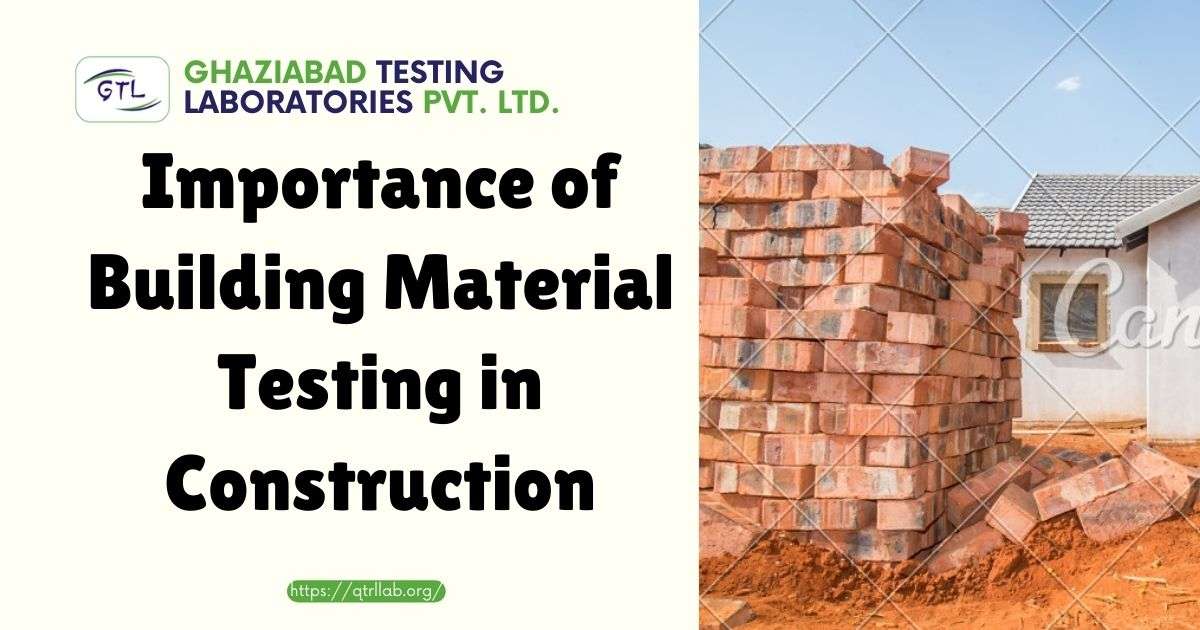Introduction
When we build structures like buildings, roads, bridges, or pavements, we rely on various materials like cement, steel, concrete, asphalt, and aggregates. These materials undergo different types of forces such as tension, compression, and shear. To ensure these materials can withstand these forces, we need to check their quality. This process is called Building Material Testing.
Building material testing refers to the process of evaluating and analyzing the properties and characteristics of construction materials. It involves conducting various tests to determine the quality, strength, durability, and suitability of materials used in construction projects. This helps ensure that the materials meet the required standards and specifications and that they will perform as expected in the intended application.
Why is Building Material Testing Important?
Testing building materials is crucial for several reasons:
- Safety: We need to make sure that the materials used in construction are durable and strong enough to prevent any accidents or failures in the future.
- Compliance: Legal regulations and building standards require materials to meet certain quality criteria. Testing ensures compliance with these standards.
- Quality Assurance: Testing helps in assessing the quality of materials, ensuring that only the best ones are used in construction projects.
- Longevity: By testing materials, we can make informed decisions that lead to longer-lasting constructions, saving time and money on repairs and replacements.
Types of Material Testing
Material testing can be divided into two main categories: destructive and non-destructive testing.
Destructive Testing
Destructive testing involves physically damaging or breaking the material to assess its properties. This type of testing provides accurate and precise data but renders the material unusable for its intended purpose. Some common destructive tests include: – Tensile strength testing: Determines the maximum amount of tensile stress a material can withstand before breaking. – Compressive strength testing: Measures the ability of a material to resist compressive forces. – Flexural strength testing: Evaluates the ability of a material to withstand bending or flexing without breaking. – Impact resistance testing: Determines the material’s ability to absorb energy from a sudden impact without fracturing.
Non-Destructive Testing
Non-destructive testing involves evaluating the properties of materials without causing any damage or alteration. This type of testing allows for the continued use of the material after the assessment. Some common non-destructive tests include: – Ultrasonic testing: Uses high-frequency sound waves to detect flaws or defects in materials. – X-ray testing: Provides internal images of materials to identify structural issues or defects. – Thermal imaging: Measures temperature variations to identify anomalies or weaknesses in materials. – Magnetic particle testing: Detects surface or near-surface defects by applying magnetic fields to the material.
Where is Testing Done?
Building material testing can be conducted both in laboratories and onsite.
Onsite Testing: Materials are tested directly at the construction site using specialized equipment. If results are inconclusive, further testing may be done in a laboratory.
Laboratory Testing: This is more comprehensive and is usually done when onsite testing doesn’t provide clear results. Labs are equipped with various instruments for detailed analysis.
How Building Material Testing Helps in Construction
- Identifying Issues: Testing helps in identifying any potential problems with materials that could lead to future defects or failures.
- Preventing Risks: By addressing issues early on, risks in construction projects can be minimized or eliminated altogether.
- Ensuring Quality: Testing provides confidence that the materials being used are of high quality and suitable for the intended purpose.
Equipment Used for Testing
Different types of equipment are used for building material testing, depending on the specific tests being conducted. Some common equipment includes: –
- Soil Testing Equipment: Core cutters, consolidation apparatus, etc.
- Rock Testing Equipment: Core drilling machines, compression testers, etc.
- Concrete Testing Equipment: Compression testing machines, permeability apparatus, etc.
- Bitumen & Asphalt Testing Equipment: Marshall apparatus, skid resistance testers, etc.
- General Laboratory Equipment: Weighing balances, ovens, etc.
- Universal testing machines: Used to assess the mechanical properties of materials, such as tensile strength, compressive strength, and hardness.
- Moisture meters: Measure the moisture content in materials, such as wood, concrete, or soil.
- Spectrometers: Analyze the chemical composition of materials to ensure they meet the required specifications.
Conclusion
In conclusion, building material testing is a critical aspect of construction projects. It helps ensure safety, quality, compliance, and cost optimization. By conducting various tests, construction professionals can make informed decisions about the selection and use of materials, leading to successful and durable construction projects.
Are you planning a construction project?
Trust Ghaziabad Testing Laboratories for reliable quality testing. Our experts ensure your materials and processes meet the highest standards. Contact us today to learn more about our services and secure the success of your project.















